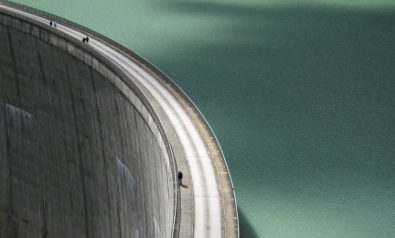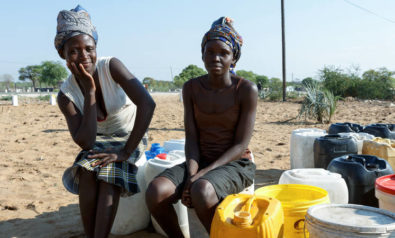The Israeli blockade and a deferral of proper joint management prevent the rehabilitation of Gaza’s failed water sector.
Damaged, fragmented water infrastructure and severe contamination are pervasive norms in the Gaza Strip. Recurring violence exacerbates destruction of the main aquifer and pipelines, as energy scarcity jeopardizes access to adequate supplies in one of the most densely populated and water-poor areas in the world. Overexploitation and lack of wastewater treatment, coupled with Israel’s effective power to determine quantity and quality of water available for distribution, are making Gaza uninhabitable.
In 1995, Israel pledged to sell Gaza a minimum of 5 million cubic meters of water per year. This arrangement was to be replaced within five years, following the conclusion of final status negotiations between Israel and the Palestinian Authority (PA). In 2015, Israel doubled annual sales, but 10 million cubic meters are still insufficient to fulfill the rapidly-growing and water-stressed population’s needs.
This unilateral action neither addresses the original causes of the water deficiencies, nor replaces the interim agreement with a sustainable system. Truly innovative solutions to water shortages in Gaza require allowances for justifiable humanitarian aid. Israel would also gain from redoubling its water sales to Gaza by publicly demonstrating goodwill to cooperate.
Following the original agreement, restrictions in deliveries of drinking water and building materials to repair and extend pipelines and power wastewater treatment have instead politicized resource management. A blockade in a territory where less than 10% of freshwater is suitable for human consumption and shortages are frequent causes people to secure domestic supplies through unsafe alternatives. Gaza residents unconnected to distribution networks—living in provisional substandard refugee housing or lacking infrastructure destroyed in deliberate or incidental attacks—use unsafe water pumped from wells.
When clean affordable options are unavailable, people depend on unregulated private vendors who mainly sell contaminated water. Without economic improvements and self-sufficiency made possible through an Israeli-Palestinian political resolution, Gaza is almost entirely dependent on external sources. This untenable status quo has raised the saliency of water conditions and environmental justice internationally.
Manufacturing Water
Aid agencies propose to supply the territory through funding construction of desalination plants that remove minerals from seawater to make it potable. Desalination technology is also offered as an incentive for achievement of permanent Israeli-Palestinian peace. Regional and international partners aim to improve the Palestinian water sector through traditional reverse osmosis desalination. Foreign governments, international organizations and other transnational institutions have identified and advocated securing monetary and capacity-building assistance to promote this process.
Currently, regional instability and widespread electricity shortages make this energy-intensive method impractical. In the interim, efficient reliance on external resources is necessary while parties pursue opportunities for viable technological intervention in the water system.
Low-tech solutions are a key to solving inadequacies in quantity and quality of supplies at this stage. Buying and producing additional water only treats the symptoms of scarcity in Gaza. Palestinian water rights deserve acknowledgement in a new transboundary water sharing agreement, together with innovation in water infrastructure. However, targeting urgent hydrological problems contributing to humanitarian disaster should be the primary concern of policymakers.
Across the Middle East, large desalination plants are increasingly essential to supplement shortages in drinking water. A more feasible option to target socioenvironmental failings in Gaza is the adoption of efficient desalination techniques in conjunction with increasing the availability of purchasable water supplies from Israel. Addressing the immediate health concerns of the water crisis will create opportunities to begin profound rehabilitation of shared water sources and replacement of decaying distribution networks. For example, maximizing efficiency in desalination energy use also has application to powering critical wastewater treatment.
As regional institutes such as the Middle East Desalination Research Center—another creation of the 1995 negotiations on water resources—promote technical training in Gaza, they can advance the research and application of shock electrodialysis desalination. This method requires less energy to operate by using shockwaves rather than the common membrane filter process to separate saline particles during water purification. Gaza is an ideal test site to pilot this treatment innovation. With greater development, this technology can become a more affordable and conventional competitor to reverse osmosis.
Solving Inadequacies
Momentum from the recently-adopted Sustainable Development Goals (SDG) and the United Nations Climate Change Agreement enables foreign investors and local parties to harness efficient approaches to water shortages. Framed in the discourse of sustainability, investment in shock electrodialysis would support adaptation to the adverse effects of climate change in conflict areas and regions particularly vulnerable to water scarcity.
Scientists and policymakers can seek enduring solutions to modern environmental challenges by leveraging action on common water dilemmas. While Palestinian President Mahmoud Abbas chastised Israeli policies on transboundary water and shared environment at the recent Climate Conference in Paris, he called for a resumption of negotiations with Israel as well as technological innovation. Motivating political will to act on the main problems of the Gaza water situation can be an opening to long-term cooperation and security.
Exploitation of existing desalination knowledge networks to secure potable water sources is a less costly means of water production. This impactful attempt to stabilize Gaza’s water supplies will benefit arid and resource-threatened states across the region.
Despite ongoing dispute, water is the one issue on which the Israeli and Palestinian governments have regularly coordinated. As a transboundary necessity, water provides a venue for sustained collaboration and negotiation that can soften the parties to peace through pursuit of innovative solutions to major climatic challenges.
The views expressed in this article are the author’s own and do not necessarily reflect Fair Observer’s editorial policy.
Photo Credit: Ryan Rodrick Beiler / Kame Rhienmora / Shutterstock.com
 We bring you perspectives from around the world. Help us to inform and educate. Your donation is tax-deductible. Join over 400 people to become a donor or you could choose to be a sponsor.
We bring you perspectives from around the world. Help us to inform and educate. Your donation is tax-deductible. Join over 400 people to become a donor or you could choose to be a sponsor.
Support Fair Observer
We rely on your support for our independence, diversity and quality.
For more than 10 years, Fair Observer has been free, fair and independent. No billionaire owns us, no advertisers control us. We are a reader-supported nonprofit. Unlike many other publications, we keep our content free for readers regardless of where they live or whether they can afford to pay. We have no paywalls and no ads.
In the post-truth era of fake news, echo chambers and filter bubbles, we publish a plurality of perspectives from around the world. Anyone can publish with us, but everyone goes through a rigorous editorial process. So, you get fact-checked, well-reasoned content instead of noise.
We publish 2,500+ voices from 90+ countries. We also conduct education and training programs
on subjects ranging from digital media and journalism to writing and critical thinking. This
doesn’t come cheap. Servers, editors, trainers and web developers cost
money.
Please consider supporting us on a regular basis as a recurring donor or a
sustaining member.
Will you support FO’s journalism?
We rely on your support for our independence, diversity and quality.



















